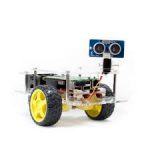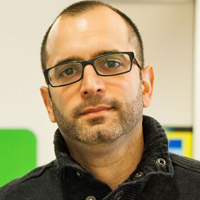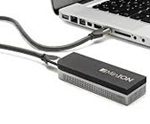Peter Allen and Yaniv Erlich awarded provost grants

Peter Allen and Yaniv Erlich have been awarded provost grants through the Hybrid Learning Course Redesign and Delivery program, which supports faculty in developing innovative and technology-rich learning strategies.
Allen will use the grant to expand and make over Computational Aspects of Robotics (COMS 4733), an introductory robotics applications course where students learn about robotics (and future research directions in robotics) by building and programming real robots. The class, which serves upper-level undergrads and master’s students, is an elective in Vision, Interaction, Graphics and Robotics (VIGR), one of the most popular Computer Science tracks.

Demand is growing rapidly as the entire robotics field is becoming increasingly important in all areas of society and the economy. Last semester, 100 students signed up for COMS 4733, though only 60 could be accommodated due to a limited number of robots.
With the provost funding, Allen will buy GoPiGo robotic kits, which are inexpensive, easy-to-build, full-capacity mobile robots with cameras and sensors. The robots will be used by students working in groups of three, and it will also increase the number of syllabus topics that can be taught “hands-on.” The GoPiGo robots will provide full network connectivity, vision cameras, ultrasonic sensors, and on-board processing with a Raspberry Pi computer. Thus topics that had to be previously covered through lectures can now be learned directly through the hands-on laboratory assignments favored by students.
“Feedback from actually running an algorithm on a real physical system, with noise, is something students cannot gain from a simulation or lecture,” says Allen. “Introducing the full-capability GoPiGo robots will let students get ‘hands-on’ experience in all parts of the course syllabus, truly bringing it all together in a coherent package.”
The small size of the new robots will also change the nature of the class. Students can take GoPiGOs anywhere, “flipping” the laboratory so that learning, once confined to the lab, can happen anywhere, and in the process, free up valuable lab space.

Erlich’s provost funding will allow him to scale up his class Ubiquitous Genomics (COMSE 6998). This class, which debuted Fall 2015, is structured around mobile DNA sequencing, an emerging technology made possible through small, hand-held, and low-cost devices that plug into a computer’s USB drive to sequence DNA in real time.

Five such devices, called MinIONs, were loaned to Erlich by the British-based manufacturer Oxford Technologies for the first iteration of the class.
The 20 Columbia students who took that class were among the first to use MinIONs as part of their educational training. The class has generated interest among the community growing up around the MinION and was the subject of numerous articles, including a recent one appearing in eLife, one of the most prestigious journals in biology.
Students used the devices to handle and sequence DNA samples themselves rather than sending them out to a lab for sequencing. Two hackathons, worth 50% of the grade, tested their ability to design and implement a workable sequencing pipeline; in the first, student teams identified food ingredients from unlabeled DNA samples; in the second, students sequenced human DNA to identify the donor. In-class presentations gave each team the opportunity to explain their methodologies and take questions and peer feedback.
The provost funding will allow Erlich to buy the MinIONs (and ensure future iterations of the class), increase class size from 20 to 40 students (and accommodate medical and biology students wanting to take the class), and expand the class goals in a couple of different ways. One new goal is for students to implement early prototypes of the Internet of Living Things, where autonomic sensors collect and analyze DNA information; a second goal is to incorporate an updated library preparation procedure that will give students more opportunity to design their own experiments from material they choose, whether it is to identify plants in Central Park, analyze the microbiome of water fountains in the city, or ensure fish served in a restaurant is as advertised on the menu.
A bigger class and its expanded goals will require ensuring students get the needed guidance. To this end, Erlich is adding a TA and also incorporating ideas from the flipped classroom approach. Student-produced YouTube videos will replace the time-consuming in-class hackathon presentations. Students will also be enlisted to help one another, both through an online forum and via short videos created by students to alert others to the common pitfalls of analyzing MinION data.
Posted 5/12/2016
– Linda Crane

